As Israeli children prepare to go back to school, the Taub Center has released a booklet on early childhood, presenting findings from a longitudinal survey conducted as part of the Taub Center Initiative on Early Childhood Development and Inequality. The survey examined the status of young children in Israel during the war, as well as the changes that occurred as the war continued — among other things emotional and behavioral difficulties of children as well as their school readiness. The aim was to assess the hardships they faced and the factors affecting them, alongside an evaluation of the parents’ own emotional state. The findings depict a complex picture of the situation of young children in Israel and highlight the urgent need to develop tailored support programs for children who have experienced trauma and for their parents as they return to their routines after summer vacation. The booklet proposes policy options that can help decision makers design assistance and support programs for young families during this challenging period.
The data were collected through an online survey of parents of children from birth to age 6, conducted in three waves between January 2024 and January 2025. A total of 1,350 parents participated, and their reports reflected both their personal situation and that of their children — emotional, behavioral, and developmental — during this period.
The following is a sampling of data from the booklet. To read the full booklet, click here.
Disruption to Children’s Daily Routine During the War
More than half of families with young children surveyed were directly harmed physically or emotionally by the war
About 55% of families surveyed in the first wave (January 2024) reported direct exposure to the war in one or more of the following ways: physical injury or psychological harm to an immediate family member or in their close social circle, evacuation from their home, or the enlistment of a parent for reserve duty in the security forces.
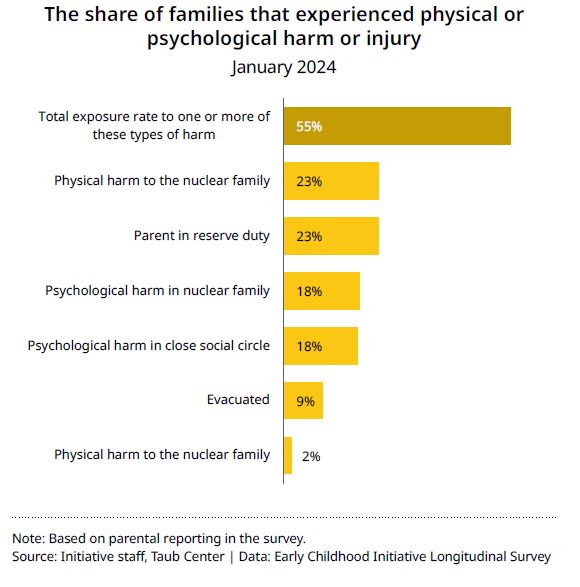
More than half of the children in the survey who needed routine treatments did not receive them suitably in the first three months of the war
Survey participants were asked whether their child required routine treatments and support (such as speech therapy, well-baby clinic checkups, health fund follow-up, and the like), and whether the child continued to receive them during the first three months of the war. According to the survey, about two-thirds of the children did not require any routine treatments. However, among those who did, only 45% continued to receive most or all of the treatments they needed in the first three months of the war. In other words, more than half of the children in the survey who required routine treatments did not receive them as needed during this period.
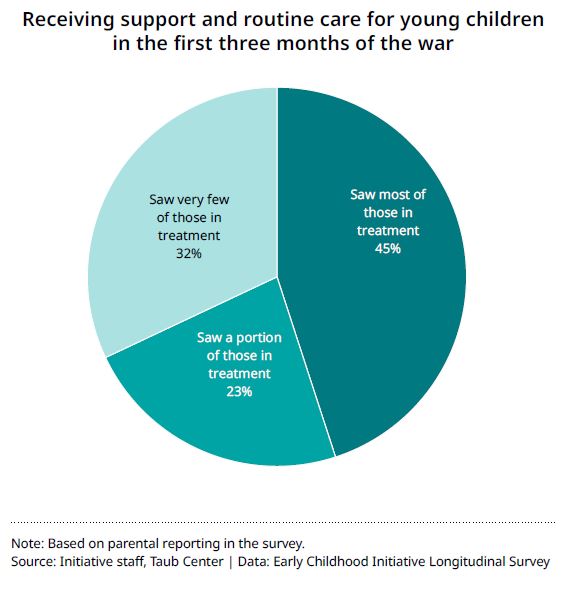
The prolonged closure of educational frameworks especially harmed children exposed to the war
The study found that young children whose educational frameworks were closed for more than two weeks at the start of the war, and who experienced a high level of exposure to war-time events, suffered from more severe emotional and behavioral difficulties than did children who were less exposed to the war. The gaps were statistically significant in the first two waves of the survey, but after a year (in the third wave) they had almost completely disappeared, regardless of the length of the closures.
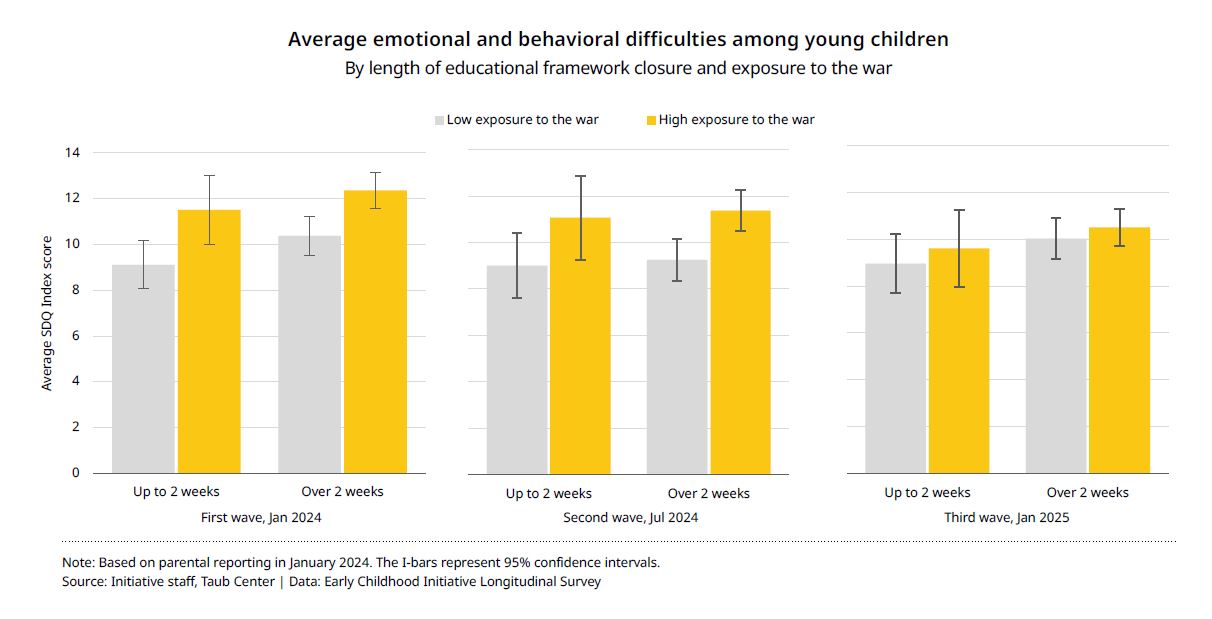
The Economic Impact of the War on Families
Arab parents reported a sharper decline in their family income during the war than did Jewish parents
The survey examined reported changes in the incomes of families with young children as a result of the war, presenting parents’ reports on changes in family income between January 2024 and January 2025, broken down by sector. The findings show that a higher share of Arab parents reported a decline in their family income than did Jewish parents: 16% of Arab parents reported a large decrease in income versus only 7% of Jewish parents, and 31% of Arab parents reported a slight decrease compared to only 17% of Jewish parents.
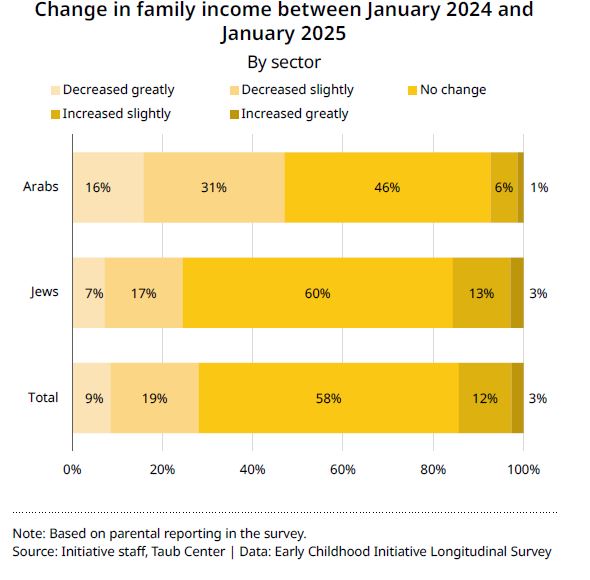
Emotional and Behavioral Difficulties Among Children
Girls experienced greater emotional and behavioral regression than boys following a parent’s prolonged absence due to reserve duty
The booklet presents the average level of emotional and behavioral regression among children by the length of a parent’s reserve duty, broken down by gender. The data show that among children whose parents served a long period of reserve duty, girls experienced on average greater emotional and behavioral regression than boys. This finding may indicate heightened sensitivity among girls to a parent’s prolonged absence due to reserve service, and underscores the need for tailored emotional support for them in such situations.
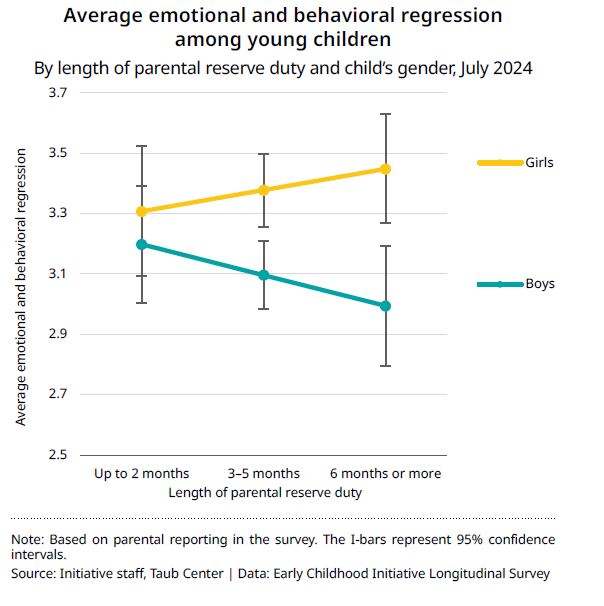
Decline in school readiness among children of parents who served in reserve duty
In the third wave of the survey, parents were asked to assess their young children’s readiness for school in light of their reserve duty following the outbreak of the war. The findings show that children whose parents were called up for reserve duty during this period were rated as having lower school readiness than children whose parents were not called up. This result was obtained after controlling for a wide range of demographic, family, and emotional variables, such as family structure, family size, and the emotional state of the parent who remained at home. This finding may reflect the consequences of a parent’s absence from home during an emergency, and the particular challenges it creates for young children at the critical stage of preparing to transition into formal educational settings.
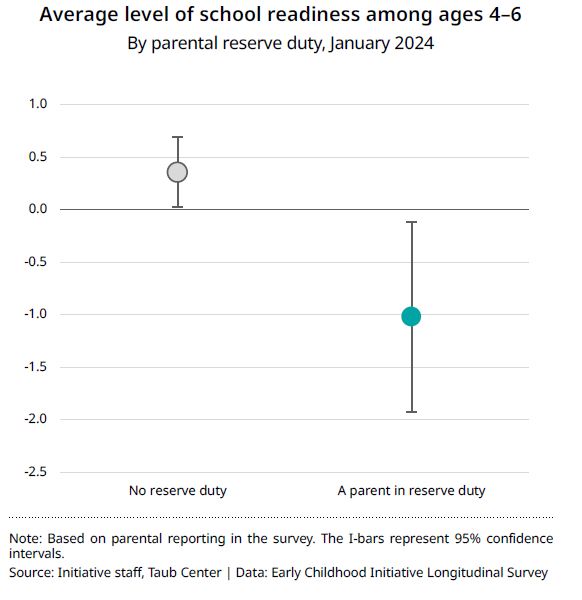
Policy Options
Given the concern that the harm to young children indicated by the survey findings may lead to severe long-term consequences, as, the researchers stress the importance of strengthening the support systems available to them during this period, as detailed below:
- Maintaining continuity of educational activity. In light of the rise in behavioral and emotional difficulties among children following the closure of educational frameworks at the beginning of the war — especially where educational settings remained closed for a long time — it is essential to ensure the continuation of educational activity even during emergencies, and, when necessary, to implement alternative education programs in order to minimize harm to children.
- Supporting families of reserve soldiers. The survey findings show that parents whose partners served long periods of reserve duty experienced emotional difficulties, which also affected their children. Accordingly, tailored support systems should be established for these families, with special attention to those with young children and to families with relatively low incomes.
- Tailored support for the Arab population. The data show that Arab parents experienced higher levels of depression, anxiety, and stress symptoms than Jewish parents, and also suffered more severe economic harm. To alleviate the unique challenges faced by the Arab population, dedicated programs should be developed for economic assistance and psychological support, and equality in the provision of services must be ensured.
Dana Shay, editor of the booklet, stated: “The survey findings reveal a complex picture: alongside remarkable signs of recovery in the emotional state of children and parents over the past year, there are still particularly vulnerable groups — such as evacuated families, families with parents in reserve duty, and families with low incomes — who continue to struggle significantly. With the right support, they can recover, but no family should be left behind. We must continue to ensure the emotional well-being of children and families to prevent long-term harm and to strengthen community resilience.”
The Taub Center for Social Policy Studies in Israel is an independent, non-partisan socioeconomic research institute. The Center provides decision makers and the public with research and findings on some of the most critical issues facing Israel in the areas of education, health, welfare, labor markets and economic policy in order to impact the decision-making process in Israel and to advance the well-being of all Israelis.
For further details or to arrange an interview, please contact Chen Mashiach, the Center Spokesperson: 054-7602151.
